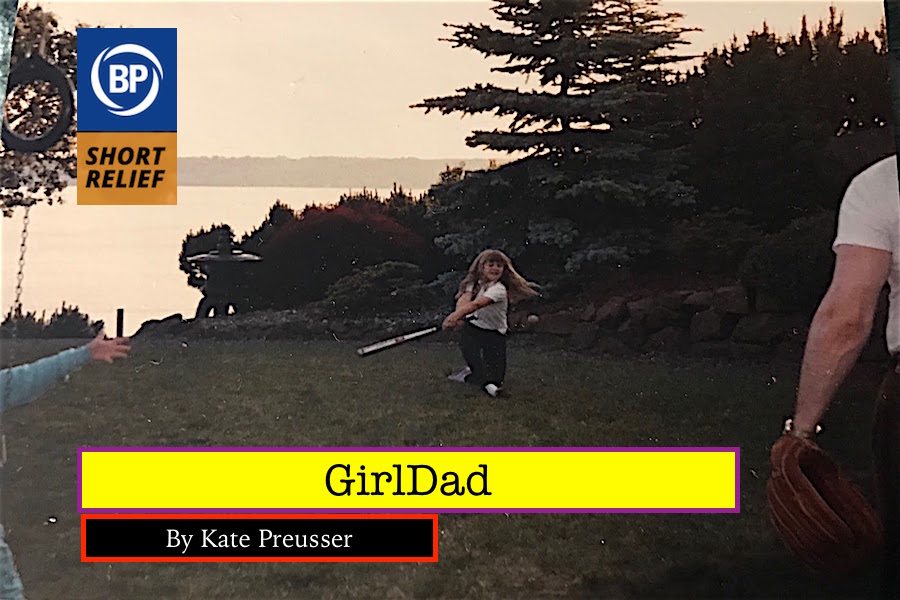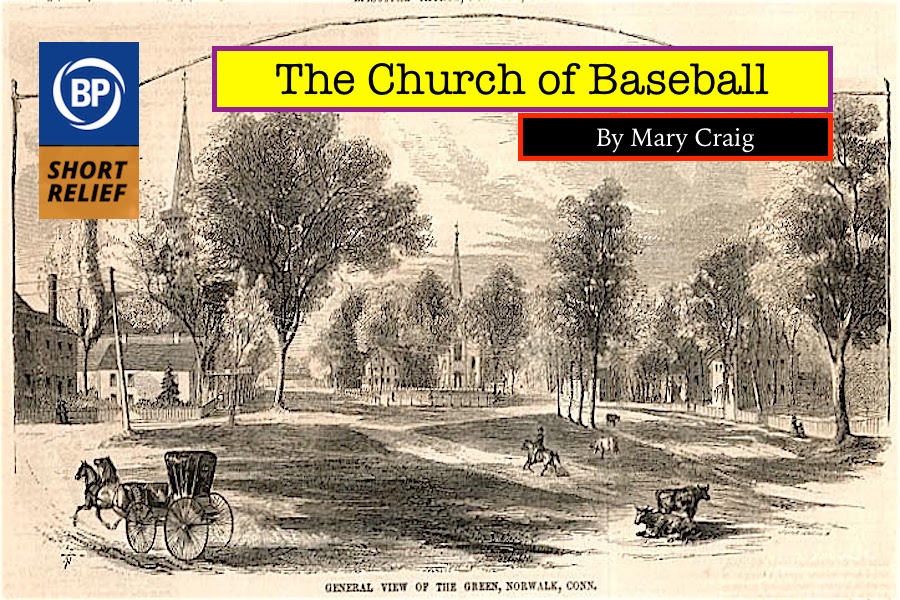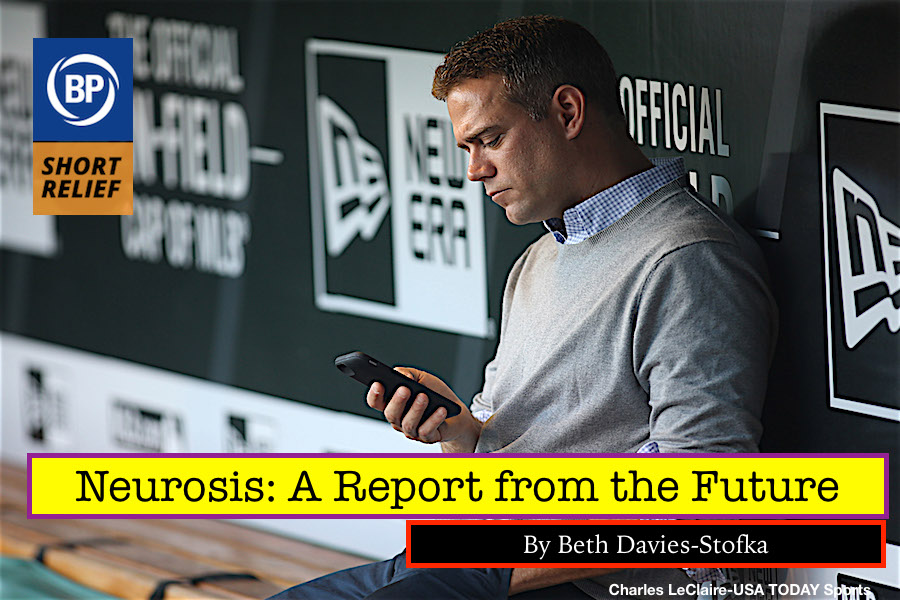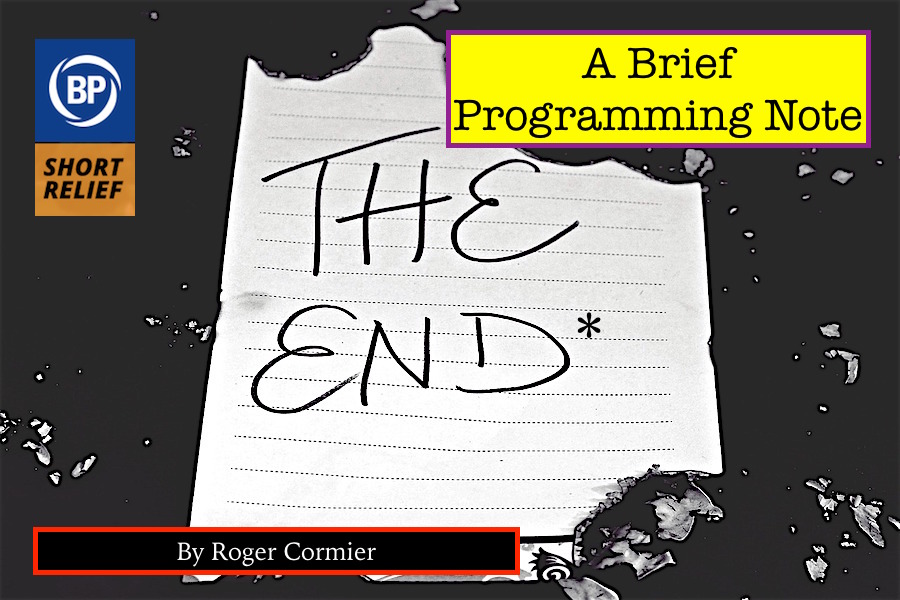
This is not what you dreamt of, tossing a soft baseball in the backyard to a daughter who swings and misses, swings and misses, while the other daughter, who is supposed to be running the makeshift bases and shagging balls, stops to put on a show from the swingset, thoroughly uninterested in the proceedings. The sky is a buttery orange against the dark trees of evening as the sun sets somewhere you can’t see. Your wife has the camera, and the picture will turn out too dark and oddly cropped, the familiar foliage of the yard a menacing wave in the background.
It’s just your arms in the frame, sinewed still from years of rowing crew, catching passes and pitching baseballs. Real pitching, not what you’re doing here, underhanding to a blonde-banged and slip-on-shoed daughter who swings and misses every time. You correct her stance, try to get the chaos of her lower half orbiting the same planet her arms are on; you try to keep her from falling to one knee as she swings. She says okay, dad, okay, I get it, and swings and misses, and falls to both knees. You surrender the idea of her becoming the starting pitcher for the University of Washington’s softball team. She is left off the roster for the All-CYO basketball tournament, because she is as poor at shooting a basketball as she is hitting a baseball, and she cries. You suggest she might row crew like you did because she, too, has a broad, strong back, and she does not find this to be a compliment. Finally, when she is placed for a third consecutive year on the freshman volleyball team, you give up the last remaining shreds of the idea that she is made in your own image.
Her interests grow less interesting to you. She is obscured behind a book, under headphones, behind a stage curtain. You are in the dark now, or she is, past a sunset you can’t see, among the menacing shapes of the backyard. Once when helping her fix her car, a temperamental roller skate of a thing she inherited from her grandmother, she twists too hard and breaks off a piece in the engine compartment, a small, inconsequential piece, but you laugh and say “not so rough, Gorgo,” which was your nickname in college, when you were strong and rowed hundreds of miles a year, and she cries and storms off, and later you get yelled at.
And still, all the time, you ask to go have a catch, during holiday dinners and summer breaks, and then one day she says yes; the backyard is overgrown now and too small anyway so you drive down the street to the park and you run through the grass like a dog unclipped from its leash, ready to shag pop flies; you could catch anything, you have that much energy stored from years of ballet recitals and musical theatre performances and sitting still in the dark.
Over the years the yeses become more frequent but your body, that reliable companion, starts to say no; you keep your foot to the floor but the car just won’t go like it used to. There are other, smaller nos: you leave the milk out one too many times and a sign goes up on the fridge; you go to the carwash and forget your wallet; words become slippery fish, hard to grasp at as they flash through your mind, the clear river of which is now spotted with dark patches, things you used to know but don’t anymore, cannot get back to. The park is too much now so you return to the backyard, where she is underhanding pitches to you, gentle tosses that somehow find your mitt each time. You switch to a softball, a sunny orange that’s easy for her to dig out when your throws go wayward, which they do more now, into that unknowable black stretch of the backyard, the dark bushes there, a wave you can’t stop from cresting, until she emerges from the blackness, bright ball held aloft, calling it’s okay, Dad, I got it.

For much of its early history, baseball was in conflict with religion. Churches didn’t want to cede their moral authority over the nation, particularly to a sport they viewed as depraved. In an effort to win over this religious audience, professional baseball teams banned drinking, gambling, and foul language. In response, religious groups pressed cities to ban the playing of baseball on Sundays. Though this feud lasted well into the 1930s, when professional baseball finally emerged triumphant, there were several attempts to merge the two great moral forces in society.
Connecticut’s Blue Laws, which had been in place in some fashion since the early 1640s, prohibited a great number of Sunday activities, matching the laws of its fellow New England states. One such activity was, of course, baseball. This did little to mitigate the increasing fervor of baseball fans in the early 1900s or convince the residents of Connecticut that the protestant churches were compatible with modernity. It soon became apparent that if forced to choose between baseball and church, most people would choose the former.
This fact was no less true in South Norwalk, a tiny town on the southern coast of the state. Desperate to prove its relevance, South Norwalk Church tried an experiment one day in April of 1913: playing a game of baseball inside the church. The game was between the junior members and the senior members of the Christian Endeavor Society, with the juniors winning 8-3. The church’s reverend, naturally, served as umpire. In front of a packed church, the most exciting moment of the game came in the ninth inning, when a pinch hitter for the seniors began a rally in which all three of the team’s runs were scored. Alas, the excitement lasted little past the third of those three runs, and the juniors held on for a comfortable victory.
In a box score-length description such as the one above, the game appeared fairly routine, aside from the place of play. In reality, however, this game little resembled baseball. It involved no gloves or bats or balls. Instead, the pitcher threw scriptural questions at the batters. If the batter got three questions wrong, they struck out, and if they answered one of the three correctly, they were awarded a base hit. Home runs were possible if the batter correctly answered each of the three questions, although no such thing occurred in the game.
Although the game was a rousing success in the eyes of its participants, it was not repeated. Baseball continued to be played with bat and ball, and church remained a place free from activity. However, the quest to make baseball religious continued for some time. But rather than molding baseball to the church, the reverse occurred; stadiums replaced churches and prayers to the Baseball Gods replaced those to the Christian God. Perhaps this little church in South Norwalk got more right about baseball than it seems.

Recent research in the archives of the third millennium reveals that Major League Baseball’s general managers began to play Sortes Virgilianae; in the second decade of the 21st century. Like the Roman generals of two millennia before, baseball’s GMs drew random lines from Virgil’s Aeneid in order to divine their futures. At this time, knowledge had largely evolved along rational, algorithmic lines, often managed by data instruments such as spreadsheets. Yet the future remained impenetrable. It was hoped by all that the poet Virgil, said to have been in possession of magical powers, would provide teams with the necessary edge to ensure the glories of postseason baseball.
Unfortunately, baseball’s GMs had no better luck with Virgil than the Roman generals. It is said that, upon reading a randomly-selected line from the Aeneid, Hadrian predicted that he would succeed Trajan as emperor, and in fact he did, and went on to reign as Emperor of Rome for 21 years. However, Gordian II, also playing Sortes Virgilianae, predicted that he would have a long line of successors. But after ruling Rome as co-emperor for only 21 days, Gordian II died in battle with only one successor, a nephew.
Baseball’s GMs shared similar outcomes. The records are sketchy, but the extant evidence suggests that Red Sox GM Theo Epstein, in the midst of a career reminiscent of Hadrian’s, drafted Mookie Betts upon drawing this line from Aeneid Book 7:
Heaven’s empress with her right hand wrenched away
The lingering bars. The grating hinges jar,
As back Saturnia thrusts the iron gates of War.
On the other hand, playing Sortes Virgilianae backfired for Twins GM Thad Levine when, in 2017, he debated whether to sign Michael Pineda. Ultimately he did, after drawing this line from Book 4:
Nor thinks such passion can be frail or fleet
We were not able to find a record of Levine’s post-Pineda career and cannot speculate whether his trajectory resembled that of poor Gordian II. Perhaps that distinction belongs to Astros GM Jeff Luhnow, fired from his job in 2020. Our research team found a badly-damaged and fragmentary record which suggests that he drew this line from Book 6 in the days following his dismissal:
Through Pluto’s solitary halls they stray,
As travellers, whom the Moon’s unkindly light
While this is far from conclusive, we couldn’t find any further record of Luhnow’s fate.
Before the use of exascale computing became widespread, the future was unknowable, so games had to be played in real time in order to determine outcomes. Indeed, the evidence suggests that the whole of humanity had to live life in real time. We therefore theorize that neurotic anxiety over an unknowable future explains a broad spectrum of long-forgotten antisocial institutions, such as religion, racism, sexism, and cheating. We believe that such anxiety was once powerful enough to distort the human condition. Our research continues.

While I was waking into the predawn hush of January 19th in Pennsylvania, the Auckland Tuatara and the Canberra Cavalry were entering the 12th inning of a strange game on the second-to-last weekend of the Australian Baseball League’s regular season.
Circumstances for the Tuatara have been somewhat strange all season, the most striking to me being the fact that the Tuatara’s games at home last only seven innings, though they play nine on the road, and all of the other teams in the league play nine innings at home (except in the case of a doubleheader, in which case game one is seven innings and the second nine, no matter the host location). The shortening is dictated by a broadcast deal with Sky Sports, intended to ease the in-house viewing experience for the home-side fanbase. Whether the difference of two innings makes any material difference in the average new-to-baseball viewer following along in Rotorua or Invercargill I can’t say, but certainly it alters the ebb and flow of the game, some element of strategy magnified by the relative tightness of a 40-game season.
The Tuatara also began the season in heartbreak: just before the curtain rose on their sophomore endeavor, Twins prospect and new team member Ryan Costello passed away in Auckland. Over the next two weeks, the team opened the season 2-8, a tough spot with a quarter of the clock run off.
But by the 19th of January, solutions to the rocky start having been found, the Auckland Tuatara found themselves grappling with the Canberra Cavalry for the lead in the Northeast Division, and with the postseason looming, a great deal rested on that Sunday game at Canberra’s MIT Narrabundah Ballpark.
The game began with nine scoreless innings and was punctuated by a number of ominous look-ins on weather radar to check the progress of a serious approaching storm cell. Because the ABL follows the World Baseball Softball Confederation conventions for tiebreakers in extra innings, the top of the tenth began with runners on both first and second base. Jonny Homza walloped a leadoff triple and Won-Seok Kim brought him in with a single, and Auckland took a three-run lead into the bottom of the inning. Canberra answered, singling in runner David Kandilas before tying the score with a gift of a walked-in run and a productive groundout. Inning eleven posted up zeros on both sides, but a pair of home runs by Homza and Jared Walker gave Auckland a heady, hopefully secure four runs with which to work.
But the best-laid schemes of Tuatara and men gang aft agley.
Those two automatic runners, a hit-by-pitch, some singles, some productive outs, and a walk bring Canberra’s Robbie Perkins to the plate with the bases loaded and the score standing 7-6.
Robbie Perkins strikes out. The ball bounces away from Auckland’s catcher. Cam Warner darts home. The score is tied, but the next Canberra batter cannot walk them off.
Inning thirteen passes scorelessly, and then the rains come.
With the score tied at 7 and following 30 minutes or so of official delay, the game is called, no later completion in the works.
There is no mechanism for how a tie counts, at least in the league table, and so each team was granted half a win (which is also to say half a loss). This is the logical choice, a way to fit a third category into a place where there are only two. But what is half a win? A disappointment or a triumph? It is, most of all, a way to make do. A half step forward is still forward.
For teams in the ABL, it has been a season of making do. Populated as the teams are by so many MLB prospects, pitching staffs change as young players hit inning limits ahead of their northern hemisphere spring and summer work, but practical, baseball-related problems seem easy enough to solve against the backdrop of the climate-exacerbated fires raging across Australia. Of the league’s eight teams, only one — Geelong-Korea — played all 40 games. Canberra and Adelaide saw a whole weekend series (four games) cancelled due to air quality, and this season forced the ABL to create an air quality policy.
Canberra, having played only 34 games this season, will scrabble against Perth in Tuesday’s wildcard game. It is an accomplishment, of course, to have more wins in 34 games than another team that had 39 or 40 chances, but Canberra might have also lead the division with more chances. These solutions in a baseball season are imperfect, but the logic of a season still holds: the teams that had the most success on the field are the ones advancing to the playoffs. In the face of climate change, we need to stop accepting half-steps forward.
Learn more about how to help Australia here.

One day Carlos Beltrán decided to humble Pete Alonso. He said to him, “Peter, there is a certain ring that I want you to bring to me. I wish to wear it for spring training, which gives you all winter to find it.”
“Uh, okay,” said Pete. “I will find it and bring it to you, but what makes the ring so special?”
“It has magic powers,” answered his manager. “If a happy man looks at it, he becomes sad, and if a sad man looks at it, he becomes happy.” Beltrán knew that no such ring existed in the world, but he wished to give Alonso a little taste of humility.
On the morning the trucks were to go off to Florida, Pete decided to take a walk in the tire yards of Flushing. He passed by a glowing Goodyear Assurance All-Season. “Have you by any chance heard of a magic ring that makes the happy wearer forget his joy and the broken-hearted wearer forget his sorrows?” asked Pete.
He watched the tire take a plain gold ring from the ground and engrave something on it. (Pete later realized the tire was probably radioactive and weird to begin with.) When Alonso read the words on the ring, his face broke out in a wide smile.
“Well, my friend,” said Beltrán, “have you found what I sent you after?” To everyone’s surprise, Alonso held up a small gold ring and declared, “Here it is, Papa Bear!” As soon as Beltrán read the inscription, the smile vanished from his face. The tire had written, “This too shall pass.”
And that’s really why Beltrán is no longer the Mets manager. Or not. Maybe it’s an allegory about the transitory, impermanent nature of life. How everything changes. (Pete Alonso has never stepped in the same river twice either, by the way.)
What I’m trying to say is Short Relief is concluding its run tomorrow. The previous two gentleman blew the “surprise.” But they were sort of lying.
Superficially, it feels like little league when basically half your team left for their summer family vacations during the playoffs. But honestly, I truly believe that everything, including Short Relief doesn’t end, it only changes.
Short Relief was a necessary, wondrous place. It was where you read the musings of otherwise very smart, kind, creative individuals trying to come to terms with their passion for a sport steeped in failure and some crappy men. Also puns.
Yes, after tomorrow you won’t see such writings in daily installments of two to three brief pieces, but they’re not going to go away. You just have to work harder to find them, which is lame, but they’re not going away. Baseball is our weather, and we will always have a take on the weather. You’ll see them on Baseball Prospectus’ main site, at other publications, in blogs, in newsletters, in books, on social media. You will hear them told around campfires and beverages for as long as baseball, and writers willing to bleed and think and feel and make a so-bad-it’s-good pun on the page, exist.
How long will they exist?
Forever.
Because nothing ends. I explained that already. Do you need another allegory?
Thank you for reading
This is a free article. If you enjoyed it, consider subscribing to Baseball Prospectus. Subscriptions support ongoing public baseball research and analysis in an increasingly proprietary environment.
Subscribe now